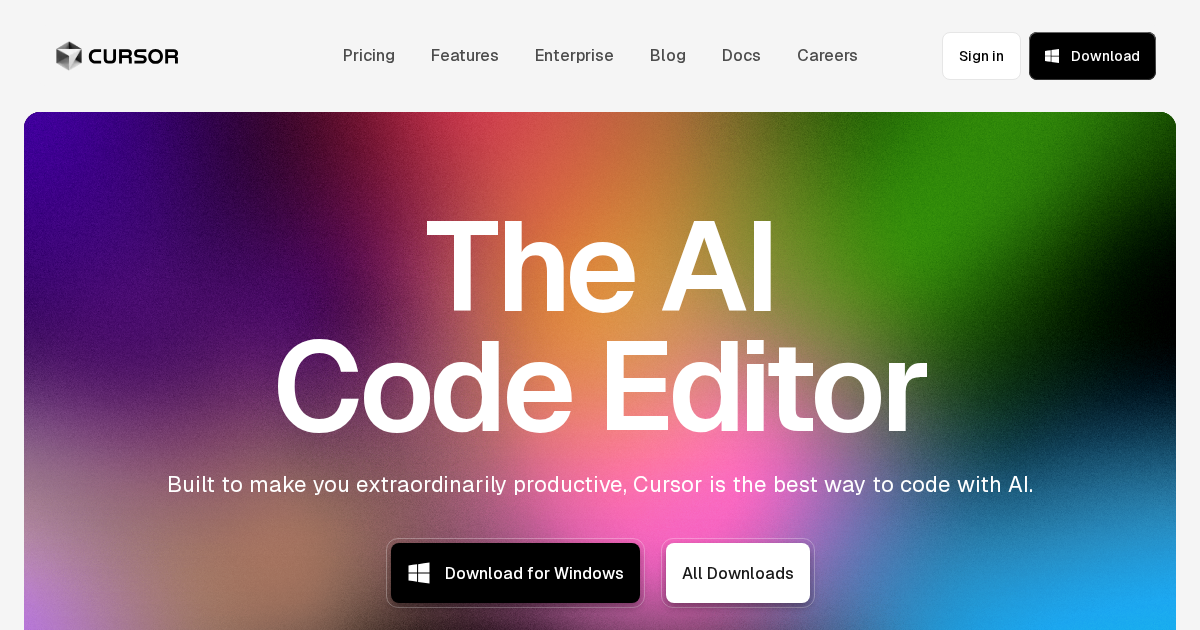Cursor — AI IDE for Developers
Cursor is a browser-based AI-powered IDE that combines code editing, terminal, debugging and a conversational assistant to speed up coding, debugging and collaboration.

Tool Information
About Cursor — AI IDE for Developers
Cursor — AI-Powered IDE
Cursor is a web-based integrated development environment that blends a modern code editor, terminal access, runtime execution, and a conversational AI assistant into a single interface. It aims to accelerate development workflows by offering context-aware code chat, one-click execution, rapid refactors, and collaboration features in the browser.
Key Features
- AI Conversational Assistant: Ask questions about your code, request explanations, generate or refactor functions, and get context-aware suggestions that operate on your project files.
- Browser IDE: Full editor with file explorer, syntax highlighting, multi-file navigation, and editor shortcuts—available without local setup.
- Terminal & Runtime: Built-in terminal and ephemeral containers to run, test, and debug code directly in the browser.
- Contextual Understanding: The AI has project context (open files, project tree, terminal output) so responses and edits are tailored to your codebase.
- Refactor & Transform: Automated refactors, code generation, type annotations, and bulk edits driven by natural language commands.
- Collaboration: Shareable sessions and links to collaborate or get help from teammates with the same project context.
- Multi-language Support: Works with popular languages and frameworks (JavaScript/TypeScript, Python, Go, etc.).
- Integrations & Extensions: Connects to git workflows and supports common developer tooling (editors, linters, formatters).
How It Helps
- Faster Onboarding: New team members can jump into a runnable dev environment with fewer local setup steps.
- Improved Productivity: Use AI to generate boilerplate, fix bugs, and search across a codebase using natural language.
- Safer Experiments: Run throwaway environments in the cloud to test ideas without touching local machines.
Pricing & Plans
Cursor typically offers a tiered model: a free tier for basic usage and paid subscriptions for advanced features, longer runtimes, higher concurrency, or priority access to AI compute. Exact plan names, limits, and pricing can change—see the official site for the current offerings and enterprise options.
Pros
- Unified environment combining editor, terminal, and AI assistant.
- Context-aware AI that operates on real project files and terminal output.
- No local setup required—runs in the browser with ephemeral runtimes.
- Powerful refactor and code transformation capabilities via natural language.
- Designed for collaboration and shareable sessions.
Cons
- Browser-based runtimes may not replace complex local dev environments for some workflows.
- Privacy and security considerations when uploading or running proprietary code in cloud containers.
- Performance and cost of AI features can vary depending on plan and workload.
- May require adjustments for team CI/CD and tooling integrations.
Use Cases / Tasks You Can Do with Cursor
- Ask the AI to explain sections of code or suggest fixes for failing tests.
- Generate boilerplate, components, or helper functions from a natural language prompt.
- Run, test, and debug scripts using the integrated terminal and runtime.
- Refactor codebase by instructing the assistant to rename symbols or extract functions.
- Share a reproducible session with teammates to review bugs or pair program.
- Migrate snippets from one language to another or update legacy APIs.
Security & Data
Because Cursor runs code and AI in cloud environments, review the provider's security and privacy documentation before using it with sensitive or proprietary code. Look for details about encryption, retention, and enterprise controls if you need strict compliance.
Getting Started (Quick Workflow)
- Create an account on the Cursor website and open a new workspace or import your repo.
- Open files in the editor and run the terminal to install dependencies and run tests.
- Use the chat pane to ask questions about the code, request refactors, or generate new functions.
- Share or export changes back to your git repo when ready.
Who Should Use Cursor
Individual developers, small teams, and engineering educators who want an integrated, AI-assisted development environment for rapid prototyping, debugging, learning, and collaboration can benefit from Cursor.
Where to Learn More
Visit the official website for up-to-date feature details, plan comparisons, documentation, and guides: https://cursor.com/
Key Features
F.A.Q
Pros and Cons
✓
Pros
- + Unified AI-driven IDE with editor, terminal, and runtime
- + Context-aware AI that works on open project files and outputs
- + Quick onboarding—no local setup required
- + Powerful refactor and code transformation via natural language
- + Collaboration and shareable sessions
−
Cons
- − Cloud-based runtimes may not suit all complex local workflows
- − Potential privacy/security concerns for proprietary code
- − Advanced AI features may have usage limits or costs
- − Integration with existing CI/CD may require configuration
Reviews
No reviews yet. Be the first to review this tool!
Applicable Tasks
Promote
Share this Tool
Similar AI Tools
Discover other tools similar to Cursor — AI IDE for Developers.
OpenAI Codex
An AI system that translates natural language into code, generates and explains code snippets across many languages and integrates via an API for coding assistants.
Jules — AI Storytelling & Creative Assistant by Google
Jules is an experimental Google AI that helps creators brainstorm, draft, and refine stories and creative text with a simple conversational interface.
Factory.ai
AI-driven connected-worker platform that converts tribal knowledge into digital work instructions, reduces errors, speeds onboarding, and delivers production insights.
OpenCode AI
AI-powered coding assistant that generates, reviews and refactors code from prompts, integrates with GitHub and VS Code, automates PRs, testing and documentation.
